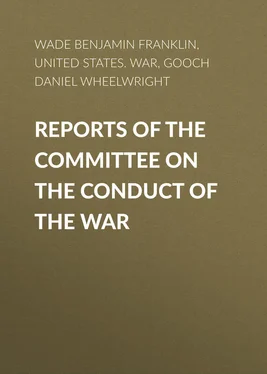Benjamin Wade - Reports of the Committee on the Conduct of the War
Здесь есть возможность читать онлайн «Benjamin Wade - Reports of the Committee on the Conduct of the War» — ознакомительный отрывок электронной книги совершенно бесплатно, а после прочтения отрывка купить полную версию. В некоторых случаях можно слушать аудио, скачать через торрент в формате fb2 и присутствует краткое содержание. Жанр: История, foreign_antique, foreign_prose, на английском языке. Описание произведения, (предисловие) а так же отзывы посетителей доступны на портале библиотеки ЛибКат.
- Название:Reports of the Committee on the Conduct of the War
- Автор:
- Жанр:
- Год:неизвестен
- ISBN:нет данных
- Рейтинг книги:3 / 5. Голосов: 1
-
Избранное:Добавить в избранное
- Отзывы:
-
Ваша оценка:
- 60
- 1
- 2
- 3
- 4
- 5
Reports of the Committee on the Conduct of the War: краткое содержание, описание и аннотация
Предлагаем к чтению аннотацию, описание, краткое содержание или предисловие (зависит от того, что написал сам автор книги «Reports of the Committee on the Conduct of the War»). Если вы не нашли необходимую информацию о книге — напишите в комментариях, мы постараемся отыскать её.
Reports of the Committee on the Conduct of the War — читать онлайн ознакомительный отрывок
Ниже представлен текст книги, разбитый по страницам. Система сохранения места последней прочитанной страницы, позволяет с удобством читать онлайн бесплатно книгу «Reports of the Committee on the Conduct of the War», без необходимости каждый раз заново искать на чём Вы остановились. Поставьте закладку, и сможете в любой момент перейти на страницу, на которой закончили чтение.
Интервал:
Закладка:
Daniel W. Gooch
Reports of the Committee on the Conduct of the War / Fort Pillow Massacre. Returned Prisoners
FORT PILLOW MASSACRE
{Rep. Com.,
{No. 63.
Resolved by the Senate and House of Representatives of the United States of America in Congress assembled , That the Joint Committee on the Conduct of the War be, and they are hereby, instructed to inquire into the truth of the rumored slaughter of the Union troops, after their surrender, at the recent attack of the rebel forces upon Fort Pillow, Tennessee; as, also, whether Fort Pillow could have been sufficiently re-enforced or evacuated, and if so, why it was not done; and that they report the facts to Congress as soon as possible.
Approved April 21, 1864.
REPORT
The Joint Committee on the Conduct and Expenditures of the War, to whom was referred the resolution of Congress instructing them to investigate the late massacre at Fort Pillow, designated two members of the committee – Messrs. Wade and Gooch – to proceed forthwith to such places as they might deem necessary, and take testimony. That sub-committee having discharged that duty, returned to this city, and submitted to the joint committee a report, with accompanying papers and testimony. The report was read and adopted by the committee, whose chairman was instructed to submit the same, with the testimony, to the Senate, and Mr. Gooch to the House, and ask that the same be printed.
Messrs. Wade and Gooch, the sub-committee appointed by the Joint Committee on the Conduct and Expenditures of the War, with instructions to proceed to such points as they might deem necessary for the purpose of taking testimony in regard to the massacre at Fort Pillow, submitted the following report to the joint committee, together with the accompanying testimony and papers:
In obedience to the instructions of this joint committee adopted on the 18th ultimo, your committee left Washington on the morning of the 19th, taking with them the stenographer of this committee, and proceeded to Cairo and Mound City, Illinois; Columbus, Kentucky; and Fort Pillow and Memphis, Tennessee; at each of which places they proceeded to take testimony.
Although your committee were instructed to inquire only in reference to the attack, capture, and massacre of Fort Pillow, they have deemed it proper to take some testimony in reference to the operations of Forrest and his command immediately preceding and subsequent to that horrible transaction. It will appear, from the testimony thus taken, that the atrocities committed, at Fort Pillow were not the result of passions excited by the heat of conflict, but were the results of a policy deliberately decided upon and unhesitatingly announced. Even if the uncertainty of the fate of those officers and men belonging to colored regiments who have heretofore been taken prisoners by the rebels has failed to convince the authorities of our government of this fact, the testimony herewith submitted must convince even the most skeptical that it is the intention of the rebel authorities not to recognize the officers and men of our colored regiments as entitled to the treatment accorded by all civilized nations to prisoners of war. The declarations of Forrest and his officers, both before and after the capture of Fort Pillow, as testified to by such of our men as have escaped after being taken by him; the threats contained in the various demands for surrender made at Paducah, Columbus, and other places; the renewal of the massacre the morning after the capture of Fort Pillow; the statements made by the rebel officers to the officers of our gunboats who received the few survivors at Fort Pillow – all this proves most conclusively the policy they have determined to adopt.
The first operation of any importance was the attack upon Union city, Tennessee, by a portion of Forrest's command. The attack was made on the 24th of March. The post was occupied by a force of about 500 men under Colonel Hawkins, of the 7th Tennessee Union cavalry. The attacking force was superior in numbers, but was repulsed several times by our forces. For the particulars of the attack, and the circumstances attending the surrender, your committee would refer to the testimony herewith submitted. They would state, however, that it would appear from the testimony that the surrender was opposed by nearly if not quite all the officers of Colonel Hawkins's command. Your committee think that the circumstances connected with the surrender are such that they demand the most searching investigation by the military authorities, as, at the time of the surrender, but one man on our side had been injured.
On the 25th of March, the enemy, under the rebel Generals Forrest, Buford, Harris, and Thompson, estimated at over 6,000 men, made an attack on Paducah, Kentucky, which post was occupied by Colonel S. G. Hicks, 40th Illinois regiment, with 655 men. Our forces retired into Fort Anderson, and there made their stand – assisted by some gunboats belonging to the command of Captain Shirk of the navy – successfully repelling the attacks of the enemy. Failing to make any impression upon our forces, Forrest then demanded an unconditional surrender, closing his communication to Colonel Hicks in these words: "If you surrender you shall be treated as prisoners of war, but if I have to storm your works you may expect no quarter." This demand and threat was met by a refusal on the part of Colonel Hicks to surrender, he stating that he had been placed there by his government to defend that post, and he should do so. The rebels made three other assaults that same day, but were repulsed with heavy loss each time, the rebel General Thompson being killed in the last assault. The enemy retired the next day, having suffered a loss estimated at three hundred killed, and from 1,000 to 1,200 wounded. The loss on our side was 14 killed and 46 wounded.
The operations of the enemy at Paducah were characterized by the same bad faith and treachery that seem to have become the settled policy of Forrest and his command. The flag of truce was taken advantage of there, as elsewhere, to secure desirable positions which the rebels were unable to obtain by fair and honorable means; and also to afford opportunities for plundering private stores as well as government property. At Paducah the rebels were guilty of acts more cowardly, if possible, than any they have practiced elsewhere. When the attack was made the officers of the fort and of the gunboats advised the women and children to go down to the river for the purpose of being taken across out of danger. As they were leaving the town for that purpose, the rebel sharpshooters mingled with them, and, shielded by their presence, advanced and fired upon the gunboats, wounding some of our officers and men. Our forces could not return the fire without endangering the lives of the women and children. The rebels also placed women in front of their lines as they moved on the fort, or were proceeding to take positions while the flag of truce was at the fort, in order to compel our men to withhold their fire, out of regard for the lives of the women who were made use of in this most cowardly manner. For more full details of the attack, and the treacherous and cowardly practices of the rebels there, your committee refer to the testimony herewith submitted.
Читать дальшеИнтервал:
Закладка:
Похожие книги на «Reports of the Committee on the Conduct of the War»
Представляем Вашему вниманию похожие книги на «Reports of the Committee on the Conduct of the War» списком для выбора. Мы отобрали схожую по названию и смыслу литературу в надежде предоставить читателям больше вариантов отыскать новые, интересные, ещё непрочитанные произведения.
Обсуждение, отзывы о книге «Reports of the Committee on the Conduct of the War» и просто собственные мнения читателей. Оставьте ваши комментарии, напишите, что Вы думаете о произведении, его смысле или главных героях. Укажите что конкретно понравилось, а что нет, и почему Вы так считаете.












